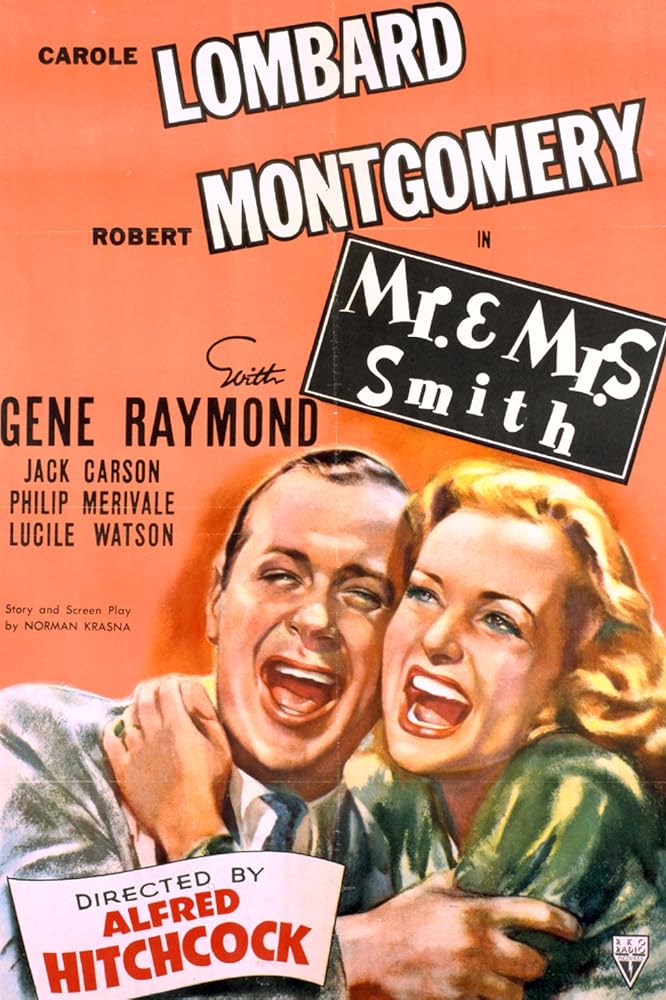
MR. AND MRS. SMITH
(director: Alfred Hitchcock; screenwriter: Norman Krasna; cinematographer: Harry Stradling; editor: William Hamilton; music: Edward Ward; cast: Carole Lombard (Ann Krausheimer Smith), Robert Montgomery (David Smith), Gene Raymond (Jefferson Custer), Jack Carson (Chuck Benson), Philip Merivale (Ashley Custer), Lucile Watson (Mrs. Custer), Charles Halton (Mr. Harry Deever), Betty Compson (Gertie), Patricia Farr (Gloria), Esther Dale (Mrs. Krausheimer); Runtime: 95; MPAA Rating: NR; producer: Harry E. Edington; RKO; 1941)
“A bland screwball comedy that never kicks into high gear.”
Reviewed by Dennis Schwartz
A bland screwball comedy that never kicks into high gear. It’s the only American comedy Alfred Hitchcock ever directed, though the ‘master of suspense’ did also go out of type to direct lighter films such as Under Capricorn and Rich and Strange. This is Carole Lombard’s return to her natural comedy roots after trying to prove herself as a serious actress in dramas the last few years. She was to only make one film after, To Be Or Not To Be, in 1942. In the same year, at the age of 33, she died in a plane crash. Lombard, a close friend of Hitchcock’s (he rented her Los Angeles home when he came from England to Hollywood), recruited him to direct. She also brought together most of the cast (Hitchcock would have preferred Cary Grant over Robert Montgomery, but he wasn’t available). Hack writer Norman Krasna provided, probably, his best script ever. Though it still lacked vinegar and was at best only serviceable.
The comedy situation revolves around successful Manhattan lawyer David Smith (Robert Montgomery) being informed in his office by Harry Deever, a small-town clerk in a western state, that his marriage three years ago to Ann Krausheimer (Carole Lombard) is not legal because of a bureaucratic technicality. Deever returns the license fee of $2 and says they just should get married again to make it legal. This comes after the bickering couple had a spat that morning over a hypothetical question David answered unsatisfactorily for Ann. She asked “If you had it to do it all over again, would you marry me?” To which Montgomery honestly replies “No! I would remain single.”
Deever also stops off at the Smith’s apartment to tell Ann the shocking news. Ann tells her mother that everything will be fine, because David is taking her out tonight to the same restaurant they frequented when he was courting her and will certainly pop the question there as he did before. But things don’t work out as expected: Ann’s dress she wore that evening is too tight to fit properly, the charming romantic restaurant changed ownership and is now a cheap unromantic joint, and during the entire evening David never tells her about their marriage being illegal.
The comedy of misunderstanding goes into full bloom, as the incensed Ann kicks David out of the apartment even though he agrees to marry her (he goes to live in his Beefeaters club). Soon Ann is courted by David’s handsome bachelor law partner Jefferson Custer (Gene Raymond), while David gets suckered into an awful blind date arranged by his club acquaintance (Jack Carson).
Jeff’s a former college mate of David’s from the south, where he was a star football player. The gentlemanly Jeff, who doesn’t drink or smoke or act sexually aggressive, takes Ann to the New York World’s Fair and a ski lodge in Lake Placid, and has asked her to marry him. It’s written in concrete in such lighthearted fare that things, no matter how bent out of shape they get, must return to normal. The third act ensures that will be the case, but in the process there’s hardly any laughs as David tries to win back his wife. The film goes with that conventional plot line to the end zone, but loses the game due to dullness.
It was all very pleasantly done, but lacked the frantic pace and keen wit to make this obvious comical situation burst out with the excesses it needed to be a successful screwball comedy. Instead, it just plods along at an evenhanded pace until it runs out of gas and ends in a whimper with the predictable resolution in hand. I lost interest midway through and nothing from thereon brought that interest back.
REVIEWED ON 6/11/2005 GRADE: C+ https://dennisschwartzreviews.com/